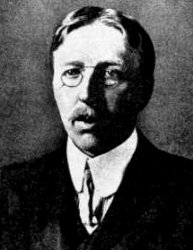Pablo Scheffer, BA English Literature student, King’s College, London
This summer I had the pleasure of spending a month as a research assistant at the Cornell University library, working on the digitalisation of the letters of Ford Madox Ford. When I started the project, I had only read a handful of Ford’s essays and none of his longer works, knowing him mostly from his connection to other modernist figures, and so I had the unusual experience of getting to know the author not through a thorough reading of his work, but rather through an immersion in his personal correspondence.
Through this experience, I came to realise to what extent we tend to view the lives of authors, especially of authors who are no longer alive, through a lens of the literature they have left behind. A great example of this is the abysmal J.R.R. Tolkien biopic Tolkien that came out earlier this year, in which the novelist’s life is portrayed as a series of events that all, in some teleological way, contribute to his creation of The Lord of the Rings. The film gives Tolkien’s life meaning purely based on its relevance for our “understanding” of his books, resulting in a strange cocktail of dragons and melodrama that seems far removed from a realistic depiction of life.
Although Tolkien’s portrayal of J.R.R.’s life is an especially cringe-inducing instance of us viewing an author through their oeuvre, it does point to what I think is a more general trend: because we have a tendency to approach authors through their stories, we seem to consider their lives, to a degree at least, as we would consider a story: as a linear narrative where elements introduced in the beginning are shown to have relevance at a later point. From our own lives we know, however, that life is expressedly not a singular, linear narrative, but rather a messy amalgamation of a great many different narratives, or perhaps not even a narrative at all.
I had never considered this difference between the way we view authors and the way we view ourselves until, through this assistantship, I spent time with the letters of Ford. Reading his correspondence, especially his correspondence with family and close friends, I was struck by the familiarity of the language – the letters appeared to me more like postcards from a good friend than the work of a high-brow modernist. The words were not stern and stately, as I had (perhaps ignorantly) expected, but often playful: they were the words of a little “Fordie” writing to his grandad, or of a playful “Pumpums” sending postcards to his “dearest little kid”.
The more I read, the more I began to form a picture of Ford which was very different from the image that I had had before. It was a picture of a man in whose life writing was admittedly a large, but far from an all-consuming part. I found that where I had initially seen the person Ford as peripheral to his oeuvre, I began instead to consider Ford’s oeuvre as peripheral to its creator. As a result, where initially the smooth surface of the literature had lured me subliminally into an artificial view of the writer’s life, viewing the literature from the perspective of the writer dissolved this smooth surface into a messy process of writing and rewriting.
Now, this is not to say that viewing a book “through” its author is necessarily always a good thing (Roland Barthes would have something to say about that) – rather, I would say that Ford’s letters have showed me how it can be a refreshing and demystifying experience to get to know an author and their literature not through the polished works of art, but rather through their rough, everyday correspondence.
Professor Sara Haslam and Professor Max Saunders would like to thank the Open University and King’s College, London for their financial support for this initiative.

